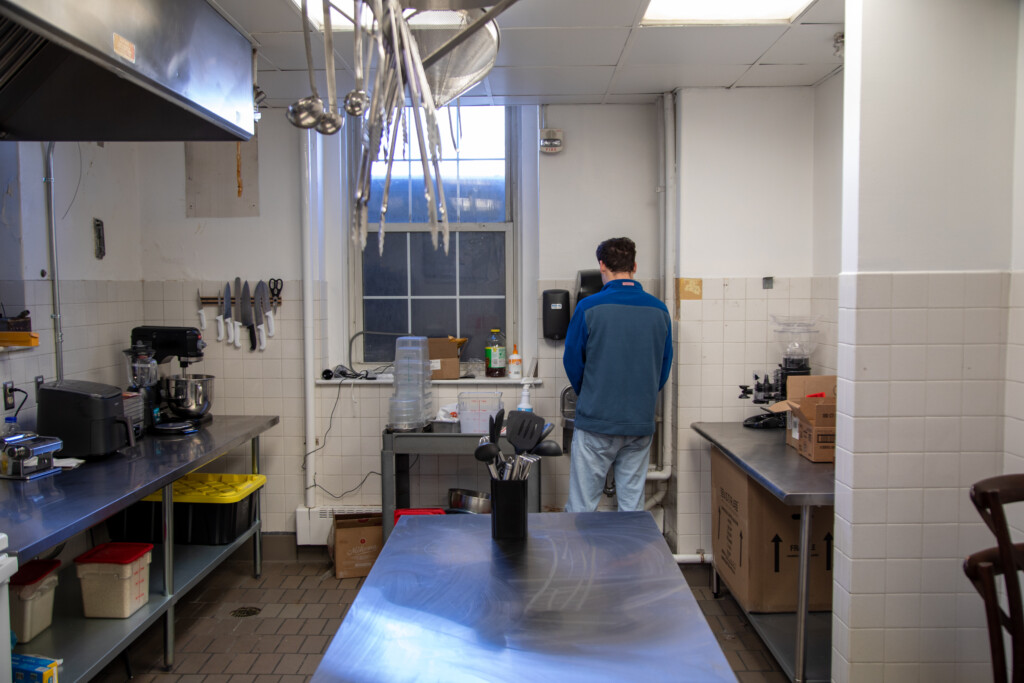In an effort to make campus dining more sustainable, Dining Services has implemented a number of programs and operations in the past year. It has increased the amount of Fair Trade coffee sold on campus, expanded the variety and amount of local foods available, started a program to compost preconsumer waste and opened Connections, putting UR on a path toward increased sustainability in Dining. Student demand was cited as having been behind many of the changes.
“Every decision we make, sustainability is in the discussion,” Marketing Manager for Dining Services Dave Feist said.
Early in Dining Services’ move toward more sustainable dining, UR joined Pride of New York, becoming the first university to do so. UR, as a member of Pride of New York, committed to buying food produced in New York State. Dining Services now buys 15 to 20 percent of its food from local producers, Director of Dining and Auxiliary Services Cam Schauf said, an amount that has increased from one percent two and a half years ago.
“It’s a pretty big deal,” Director of Operations for Dining Services Mary Locke said of UR’s joining Pride of New York.
Before joining Pride of New York, Dining Services did not always know the origin of the food it purchased from supplier Sysco Syracuse because Sysco did not label the food with that information. Locke lobbied Aramark, which represents 40 percent of Sysco’s sales, to push for Sysco to label the food. Sysco now provides a weekly list of local products to Dining Services, which uses the list to guide its purchasing.
“We’re doing it because it’s the right thing and it’s what students want,” Locke said of Dining Services’ commitment to local food.
Since October 2007, Dining Services, in a joint effort with Facilities, Waste Management and Freshlink Farms, has composted preconsumer waste, the waste created during food preparation, and coffee grounds and filters. Freshlink Farms in Penfield, N.Y., which supplies vegetables to UR, comes twice each week to collect the waste and makes it into compost that it uses to grow the vegetables eaten on campus.
The composting program did not always run as efficiently as it does now. When Freshlink began making its rounds, the collection truck drivers came inconsistently and did not know where to collect the bins. On a few occasions, Locke had to accompany the truck on its rounds to ensure that it collected all the bins. In March, Freshlink collected 4,000 pounds of preconsumer waste from UR’s dining halls.
“It took a while but we did it,” Locke said.
Because of the program’s success, there are plans to expand it to include Danforth Dining Hall, Douglass Dining Center and the Simon cart, the only dining areas not part of the program now, to have Freshlink come three times each week and to create a plan for composting postconsumer content.
In December 2007, Dining Services opened Connections, a caf that combined green construction materials, local food and compostable cutlery, plates and cups.
Connections also provided an opportunity for Dining Services to test sustainable features and, according to Schauf, it has been a success.
“We let people vote with their pocketbooks,” Schauf said.
To reduce waste even further, Connections, along with other dining facilities that use Connection coffee, returns the bags that transport the coffee for reuse. Park Avenue Bakery, which provides baked goods to Connections, ships its goods in bulk to avoid the waste that individual wrapping creates and reuses its transport boxes.
John Scanlon, owner of Park Avenue Bakery, reported that his business has nearly doubled since it became the supplier of baked goods to Connections.
“We just feel honored that we are doing well there, that we’re part of it,” Scanlon said.
Creating new relationships with the community and local business owners was another goal of Dining Services’s plans for sustainability, Schauf said.
“Many of these businesses feel like they are part of the University of Rochester,” Schauf said. “It’s that level of involvement that starts connecting the community to our program.”
Additional plans to make dining at UR more sustainable include switching to compostable containers for prepackaged food and expanding the selection and amount of local food.
Dining Services, Schauf said, also plans to improve its communication with students by holding tours of dining facilities, educating Resident Advisers so they may inform their residents and potentially replacing the Student Sustainability Coordinator with a council.
“I’m very excited and happy about where we are now, but I’m far from satisfied,” Schauf said, adding that he was optimistic because Dining Services has incorporated sustainability into its business model, signaling a shift in thinking.
Grassroots members and Student Sustainability Coordinator and sophomore Rayna Oliker, whom Schauf called “the biggest source of input,” agreed that Dining Services has made its operations more sustainable but can still improve.
“They deserve a lot more praise than they get,” Grassroots Co-President and sophomore Alexandra Beren said, citing Dining Services’ responsiveness to student input.
Oliker said that Dining Services has shown a willingness to change and, though it has not been able to pursue all the measures available, this interest in change is significant.
“The fact that our staff is behind it gives us a lot more potential and a lot more options,” Oliker said.
Fleming is a member of the class of 2010.

